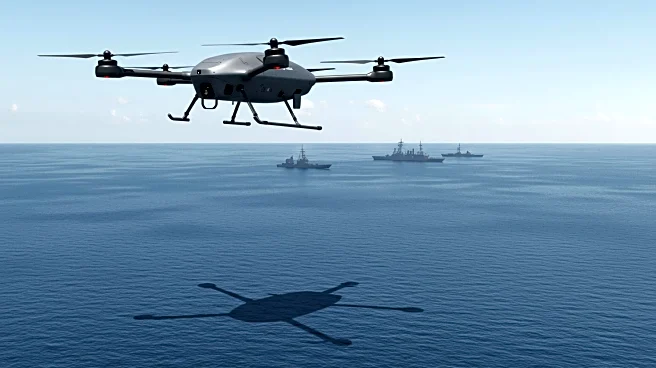What is the story about?
What's Happening?
The Chinese People's Liberation Army (PLA) has revealed its use of high-altitude long endurance (HALE) unmanned aerial vehicles (UAVs) for maritime operations aimed at identifying and monitoring foreign warships. This capability was showcased in a documentary aired by China Central Television (CCTV), highlighting the collaboration between UAV operations and intelligence officers within air brigades. The documentary featured UAVs such as the Guizhou WZ-7 Xianglong and the AVIC Wing Loong-10, operating from airbases in Foshan and Suixi, both under the PLA's Southern Theater Command. The UAVs are tasked with searching for hostile warships when Chinese reconnaissance satellites fail to track them, with intelligence personnel analyzing data to identify potential foreign vessels.
Why It's Important?
This development underscores China's growing military capabilities and its strategic focus on enhancing maritime surveillance. The use of UAVs for real-time intelligence gathering reflects China's commitment to protecting its national interests and maintaining readiness in contested waters. This capability could impact regional security dynamics, particularly in the South China Sea, where multiple nations have competing territorial claims. The PLA's advanced surveillance operations may lead to increased tensions with other countries, especially those with naval presence in the region. The ability to monitor foreign warships more effectively could provide China with a strategic advantage in maritime disputes.
What's Next?
As China continues to develop its UAV capabilities, other nations may respond by enhancing their own surveillance and defense systems. This could lead to an arms race in UAV technology and increased military spending in the region. Additionally, diplomatic efforts may intensify as countries seek to address the implications of China's enhanced surveillance capabilities. The international community may call for transparency and dialogue to prevent misunderstandings and potential conflicts arising from increased military activities in contested waters.
Beyond the Headlines
The use of UAVs for maritime surveillance raises ethical and legal questions regarding privacy and sovereignty. The deployment of such technology in international waters could lead to debates over the legality of surveillance operations and the potential for violations of international law. Furthermore, the reliance on advanced technology for military operations highlights the growing importance of cybersecurity and the need to protect sensitive data from potential cyber threats.















